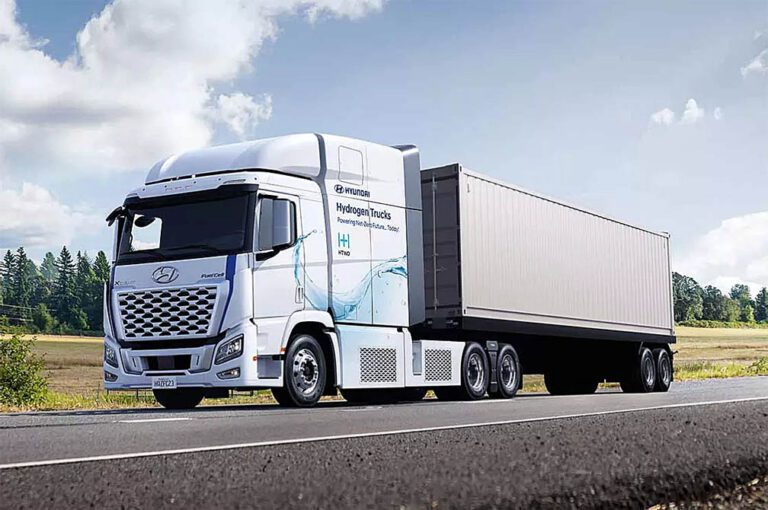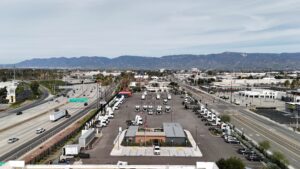ANAHEIM, Calif. — Hyundai Motor Company has introduced a new Class 8 hydrogen fuel cell electric tractor for use in North America as part of the company’s initiative to move toward alternative energy sources for its vehicles.
The rig, based on Hyundai’s XCIENT truck that’s currently used in South Korea, was first shown at the Advanced Clean Transportation (ACT) Expo earlier this month.
Hyundai also announced plans to develop a clean hydrogen ecosystem through a “Waste-to-Energy” program. That means the hydrogen production system uses the biogas extracted from organic waste such as food waste, livestock manure and sewage sludge.
The clean hydrogen is then applied in various industries, including transportation, construction and power generation.
Hyundai is currently demonstrating the concept business model with a local Korean government and reviewing the expansion of the demonstration to cities outside Korea as well.
Ken Ramirez, executive vice president and head of Global Commercial Vehicle and Hydrogen Fuel Cell Business at Hyundai, emphasized the importance of achieving carbon neutrality to realize the company’s vision of “Progress for Humanity.”
He said the company has a strong commitment to hydrogen mobility and an “ambition to foster the development of a clean hydrogen ecosystem.”
“We firmly believe that hydrogen is one of the most powerful and pragmatic solutions for achieving our vision of ‘Progress for Humanity’ with emission-free mobility as a fundamental pillar for a sustainable society,” Ramirez said. “Our hydrogen fuel cell technology has pioneered the industry, with a real-world proven track record of its efficiency and durability.”
Ramirez added that Hyundai is “leveraging these merits to further transform transportation with hydrogen energy for a broad range of mobility applications, including commercial vehicles, marine vessels and even air mobility. We now look beyond mobility toward an integrated hydrogen ecosystem, from production of hydrogen to its storage, transport and delivery. Hyundai is uniquely positioned to cover all aspects and deliver a seamless solution across the value chain.”
Mark Freymueller, senior vice president and Head of Commercial Vehicle Business Innovation at Hyundai, said the company’s plan for XCIENT Fuel Cell trucks “underlies the company’s local partnerships to form a solid hydrogen value chain as building blocks toward accelerating the deployment of clean fleets in the U.S.”
“For years, we have been initiating hydrogen value chains in various regions,” he said. “Together with our partners, we are making hydrogen mobility a viable solution for our customers. We go beyond the truck itself to include areas such as hydrogen refueling and truck maintenance.”
Freymueller added that the company plans to do the same thing here in the U.S.
At the ACT expo, Hyundai executives shared the company’s overall outlook for an eco-friendly commercial vehicle business incubation project at the Hyundai Motor Group Metaplant America (HMGMA), the dedicated electric vehicle factory that’s being built in Georgia.
The project is centered on the development of a hydrogen mobility value chain, the company said.
HMGMA will be equipped with technologies that can produce up to 300,000 electric vehicles annually.
First launched in 2020, XCIENT Fuel Cell has been deployed in five countries, including Switzerland, Germany, Israel, Korea and New Zealand, and has successfully accumulated over 4 million miles so far.
The model shown at the ACT expo is the 6-by-4 tractor equipped with two 90 kW hydrogen fuel cell systems (total 180 kW power) and a 350 kW e-motor. Its gross combination weight is a maximum 82,000 pounds and offers a driving range of over 450 miles per charge even when fully loaded, according to Hyundai.
“Hyundai has been focusing on hydrogen for over 20 years,” Martin Zeilinger, executive vice president and head of Hyundai’s Commercial Vehicle Development, said. “Our advanced fuel cell technology already is in use through various applications and especially in the commercial vehicle sector, showing its powerful performance and reliability.”
Zeilinger and other Hyundai executives made one thing clear at the expo: The company views hydrogen as the clean energy solution for commercial vehicles, including energy-intensive heavy-duty trucking, due to their various advantages in production, transportation, distribution and storage.
“Hydrogen is an energy carrier with high density that allows fuel cell electric vehicles (FCEV) to provide sustained energy output suitable for long-haul driving and carrying heavy loads,” a new release stated. FCEVs enhance work and infrastructure efficiency compared to battery electric vehicles by minimizing downtime with quicker refueling.”
Hyundai executives say that with the U.S. government’s support and more players entering the hydrogen market, they are “confident that the total cost of ownership for FCEVs will drop considerably, and that climate change and supply chain issues will accelerate the transition to clean energy sources.”
The Trucker News Staff produces engaging content for not only TheTrucker.com, but also The Trucker Newspaper, which has been serving the trucking industry for more than 30 years. With a focus on drivers, the Trucker News Staff aims to provide relevant, objective content pertaining to the trucking segment of the transportation industry. The Trucker News Staff is based in Little Rock, Arkansas.











